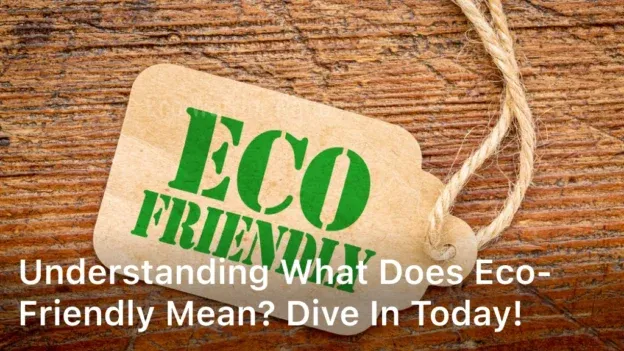ecowarriornation.com. Understanding What Does Eco-Friendly Mean? Dive In Today! Explore with us the true meaning of “What does eco-friendly mean?” Discover how it impacts our lives and ways to make a greener Indonesia today! Welcome to our article on eco-friendliness! In this section, we will explore the true meaning of the term and its significance in our daily lives. We believe that understanding the concept of eco-friendliness is crucial to creating a sustainable future for Indonesia. Join us as we dive in today! Key Takeaways Eco-friendly means practices or products that are not harmful to the environment. It is important to adopt eco-friendly practices to create a greener Indonesia. Eco-friendliness has significant benefits for the environment, society, and the economy. There are practical ways to embrace eco-friendliness in our daily lives. There are inspiring eco-friendly initiatives taking place in Indonesia. What Does Eco-Friendly Mean? At its core, eco-friendly refers to actions and products that minimize harm to the environment. As awareness of our impact on the planet grows, so too does the importance of understanding what eco-friendly means and how it can shape a sustainable future for all. In this section, we will explore the definition of eco-friendly and the principles it embodies. The Definition of Eco-Friendly The term “eco-friendly” originated from the phrase “ecologically friendly,” which reflects the idea of promoting a harmonious relationship between humans and the natural world. At its simplest, being eco-friendly means minimizing our carbon footprint and reducing waste in all aspects of daily life. More broadly, eco-friendliness can encompass a range of practices, including: Using renewable energy sources Reducing water consumption Reducing plastic usage and waste Recycling and composting Making environmentally conscious choices when shopping, including opting for sustainable materials and products Conserving resources, such as food and energy Eco-friendliness is not just about personal actions, however. It can also refer to companies and organizations taking steps towards sustainability, such as using eco-friendly materials and reducing emissions. The Principles of Eco-Friendliness At the core of eco-friendliness is the principle of sustainability, which seeks to ensure that natural resources are used in a way that will allow future generations to enjoy them as well. This means adopting practices that reduce waste and protect the environment from harm, including pollution and habitat destruction. Eco-friendliness also encompasses the principles of social responsibility and economic viability. An eco-friendly approach should aim to benefit both society and the economy, creating a balance between environmental impact and human well-being. Eco-friendliness is not a trend or a fad. It is a fundamental shift towards a more sustainable way of living that benefits both the planet and its inhabitants. By understanding the definition and principles of eco-friendliness, we can begin to see just how impactful our individual actions can be. Whether it’s by reducing waste or supporting environmentally conscious companies, we all have a role to play in shaping a greener future for Indonesia and beyond. The Importance of Being Eco-Friendly As we have explored in the previous section, the term “eco-friendly” refers to practices that are sustainable and minimize harm to the environment. But why is being eco-friendly so important? Let’s take a closer look. Significance of Eco-Friendly First and foremost, eco-friendliness is crucial for the well-being of our planet. With the increasing threat of climate change and the depletion of natural resources, it is more important than ever to adopt practices that minimize our impact on the environment. Furthermore, being eco-friendly can also have significant social and economic benefits. By reducing our consumption of natural resources and reducing waste, we can create a more efficient and sustainable society. This, in turn, can lead to long-term economic benefits and improved quality of life for individuals and communities. Importance of Eco-Friendly There are many reasons why being eco-friendly is important, but perhaps the most significant is the impact it can have on our future. By adopting sustainable practices now, we can help create a better world for future generations. This means preserving natural resources, reducing our carbon footprint, and creating a more sustainable and equitable society. Moreover, being eco-friendly can also have a positive impact on our personal health and well-being. By reducing our exposure to harmful chemicals and pollutants, we can improve our overall quality of life and reduce the risk of illnesses and diseases. Join the Movement As individuals, communities, and businesses, we all have a role to play in promoting eco-friendliness. By embracing sustainable practices in our daily lives, we can create a more sustainable and equitable world for ourselves and future generations. Whether it’s reducing waste, conserving energy, or supporting eco-friendly initiatives, there are many ways to make a positive impact on the environment. So let’s join the movement towards a greener Indonesia and do our part to create a brighter future for all. Ways to Embrace Eco-Friendliness Being eco-friendly may seem daunting at first, but there are many simple and practical steps we can take to reduce our impact on the environment. Here are some ways to embrace eco-friendly practices: Reduce, Reuse, Recycle The three R’s of eco-friendliness – reduce, reuse, recycle – are an easy way to start. Reduce your consumption of single-use plastics by bringing reusable bags, bottles, and containers. Reuse items like shopping bags, jars, and clothes instead of buying new ones. Finally, recycle any materials that are recyclable to help reduce waste. Conserve Energy Reducing energy consumption is another way to be eco-friendly. Small actions like turning off lights and unplugging electronics when not in use can have a big impact. Consider upgrading to energy-efficient appliances and using natural light instead of artificial lighting. Eat Sustainable Food Food production has a significant impact on the environment. Choose locally-sourced, organic, and seasonal produce to reduce the carbon footprint of your meals. Cutting back on meat consumption is another way to be eco-friendly, as the production of animal products generates a large amount of greenhouse gases. Use Clean Transportation Opt for public transportation, cycling, or walking instead of driving a car to reduce carbon emissions. If





